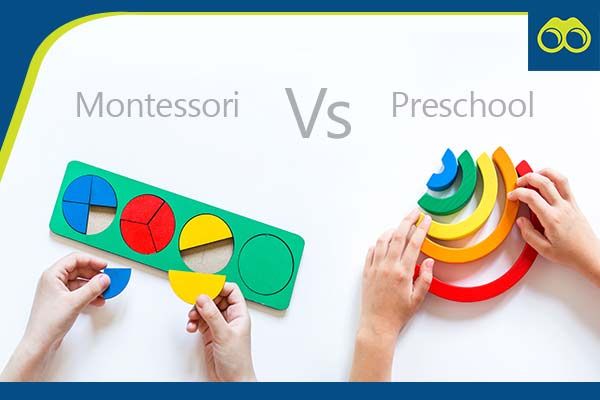Category: Recommendation

Choosing an educational system for your child is one of the most important decisions you'll make as a parent. Montessori and preschool are two popular options for early education, and both have unique strengths and weaknesses. In this article, we'll explore the differences between these two approaches to help you make an informed decision about your child's education.
The Montessori method is a child-centered approach to education that emphasizes independence, self-directed learning, and respect for the child's individuality. In a Montessori classroom, children work on activities and projects at their own pace, with guidance from the teacher. The Montessori method is based on the belief that children have a natural desire to learn, and that they learn best through exploration and discovery.
Related Blog : What is the Montessori Method of Teaching?
Preschool is a more traditional approach to early education that is designed to prepare children for kindergarten and beyond. Preschool typically involves a structured curriculum that focuses on basic academic skills such as reading, writing, and math. The teacher plays a more directive role in preschool, leading lessons and activities and providing guidance to the children.
Related Blog : Different Teaching Methods Used in Preschools
One of the main differences between Montessori and preschool is their approach to curriculum. Montessori emphasizes hands-on learning and exploration, with a focus on the child's interests and abilities. The curriculum is designed to be open-ended and flexible, allowing children to learn at their own pace and follow their own curiosity. In preschool, the curriculum is more structured and focused on specific academic skills. Children learn through teacher-led activities and lessons, with less emphasis on individual interests and exploration.
Another key difference between Montessori and preschool is the classroom environment. In a Montessori classroom, children are encouraged to explore and learn independently. The classroom is designed to be child-friendly, with materials and activities arranged in a way that promotes independent learning. In preschool, the classroom is more structured, with desks, chairs, and traditional teaching materials such as whiteboards and posters.
The role of the teacher is also different in Montessori and preschool. In Montessori, the teacher serves as a guide and mentor, providing support and guidance to the child as they explore and learn. The teacher observes the child's interests and abilities and helps to guide them towards activities and projects that will promote their development. In preschool, the teacher plays a more directive role, leading lessons and activities and providing guidance to the children.
Parent involvement is an important part of both Montessori and preschool education. In Montessori, parents are encouraged to be actively involved in their child's education, observing their child's progress and working with the teacher to create a personalized learning plan. In preschool, parents are often invited to participate in classroom activities and events, but their involvement is less focused on individualized learning.
The cost of Montessori and preschool education can vary widely depending on the school and location. Montessori schools tend to be more expensive than preschools, in part because of the smaller class sizes and specialized materials used in the Montessori method.
Deciding between Montessori and preschool can be a difficult decision. It's important to consider your child's personality, learning style, and interests when making this decision. If your child is independent, curious, and enjoys exploring and learning on their own, Montessori may be a good fit. If your child thrives in a more structured environment and benefits from teacher-led activities and lessons, preschool may be a better option.
Related Blog: Find the best preschool for your kid because a strong base ensures a better future
Conclusion:
In conclusion, both the Montessori and preschool offer unique approaches to early education. While the Montessori method emphasizes independence, self-directed learning, and individuality, preschool is more structured and focuses on specific academic skills. The choice between these two approaches depends on your child's personality and learning style, as well as your own values and priorities as a parent. It's important to do your research, visit schools, and talk to educators and other parents to make an informed decision about your child's education.
Ultimately, the goal of both Montessori and preschool is to help your child develop a love of learning and prepare them for success in school and beyond. By choosing an educational system that aligns with your child's needs and interests, you can give them the best possible start in life. Visit the website for more information Skoodos.com.
 Blog: Recently Added
Blog: Recently AddedIf you’re a parent in India today, you’ve probably heard about NEP 2020, but you may still be w...
Every parent who is looking at schools today eventually asks this question: If we don’t live in...
Every parent reaches a point where this question quietly starts coming up: Should we consider boardi...
For many families in India, choosing a school is one of the most important long-term decisions they...
For years, higher education in India came with an almost unspoken rule: if you want a “good” de...
For most parents, choosing a school isn’t just an academic decision; it’s emotional, stressful, and...
Deciding on a school today is quite different from what it was a decade ago. Parents are not just co...
While making a decision about a school is not a very easy task, it is now more complex.While making...
Selecting the proper school has never been an easy task. For parents of Indian children, it is often...
A decade ago, school admissions were characterised by queues, forms, physical counselling, and limit...

